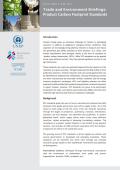This publication calls for a shift away from labour- and resource-intensive production towards resource-efficient productivity. Only if changing patterns of consumption are aligned with corresponding transformations in governance systems and companies, can a real green growth transition occur. Therefore green growth needs to combine business and household strategies towards a better life for all.
In this paper, the authors consider only two great transformations in the history of human mankind to be comparable to the Great Transformation towards a global low-carbon economy faced now: the Neolithic Revolution and the Industrial Revolution. This paper discusses different social, economic, and cultural theories which might help to understand this far reaching socio-economic transformation and focus on specific arenas of change in which low-carbon dynamics occur. The authors argue that the technological, economic, and social main elements which will permit the transformation to be made to climate compatibility are already emerging. On the other hand the speed and geographical spread of the low-carbon dynamics are still not sufficient to avoid dangerous climate change.
The paper provides details on the OECD green growth strategy and focuses on what lessons the aid-for-trade community can learn from this work. The paper reviews the current literature on aid for trade and green growth as well as broader work on green growth and developing countries and the role of development co-operation. It provides an overview of the aid-for-trade flows that support environmental objectives with examples of particular projects. The paper highlights that environmental objectives have long been articulated in aid programmes and that although Official Development Assistance (ODA) is a relatively minor contributor to green growth, its role can be catalytic.

Food exporters are increasingly being asked by retailers to measure and reduce the greenhouse gas (GHG) emissions of their products, and new market requirements have emerged, mainly in the form of standards on ‘product carbon footprinting’ (PCFs). The current policy brief indicates that PCF standards have gained significant traction in the agri-food sector, and they can create new potential opportunities for exporters in the transition to a green economy.
The policy brief introduces the following findings:
In the full recognition of the seriousness of climate change problems, Korea announced a new policy towards greening its economy. In his address marking the 60th anniversary of Korea’s foundation in 2008, President Lee Myung-bak declared ‘Low Carbon Green Growth’ as the country’s new vision to lead the country’s development for the next decades. In 2009, the government announced the ‘National Strategy for Green Growth’ up to 2050, to be gradually implemented through five-year plans.
The national strategy envisages three main objectives: (1) mitigation of climate change and the strengthening of the country’s energy independence, (2) creation of new growth engines, and (3) improvement of the quality of people’s lives and enhancement of Korea’s international status. These goals are pursued by 10 designated policy directions, such as mitigation of greenhouse gas emissions, development of green technologies, creation of a green homeland and others.
